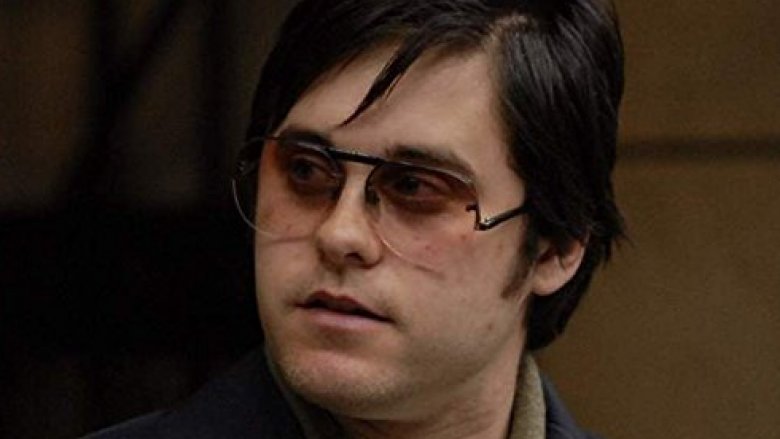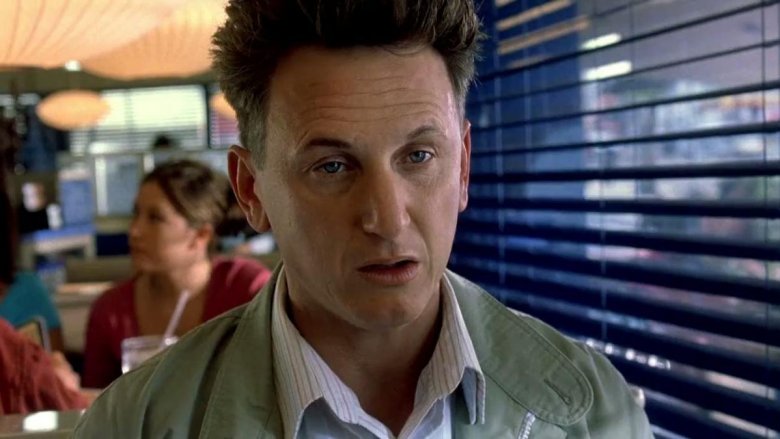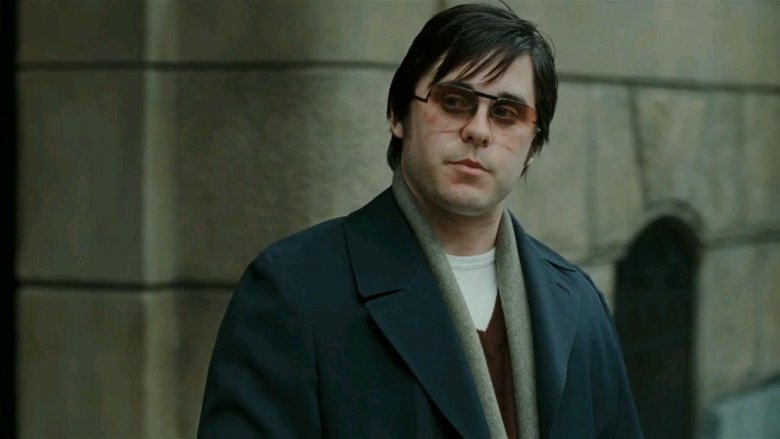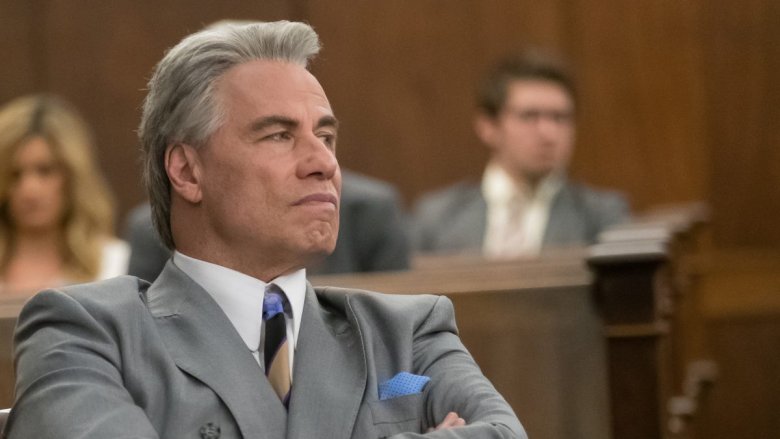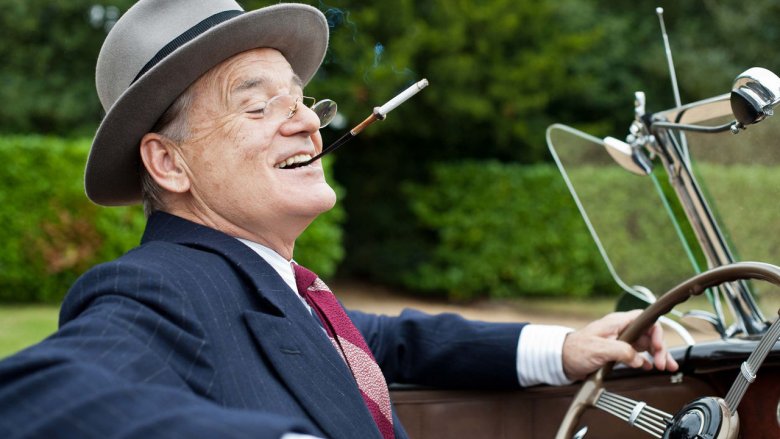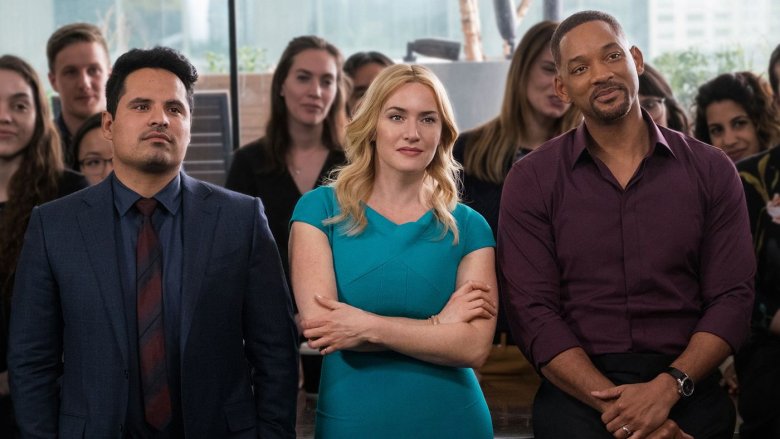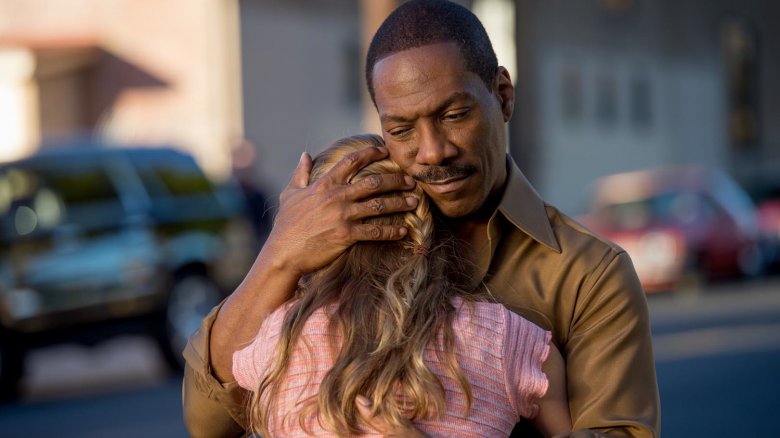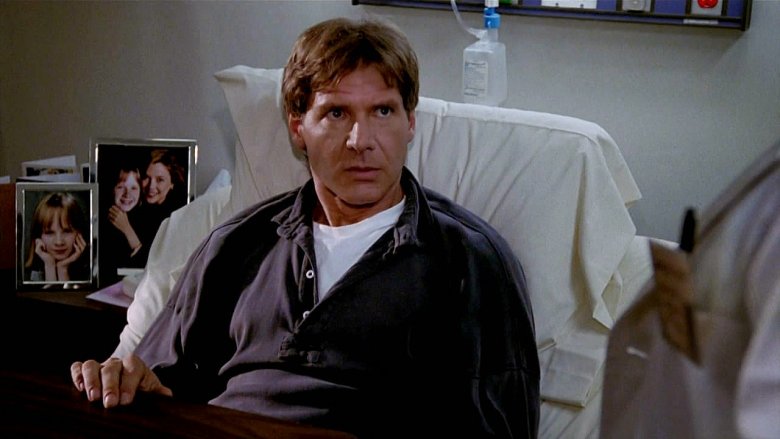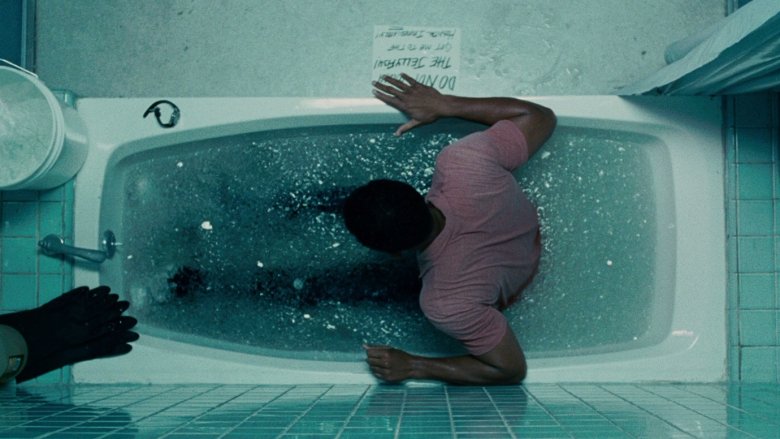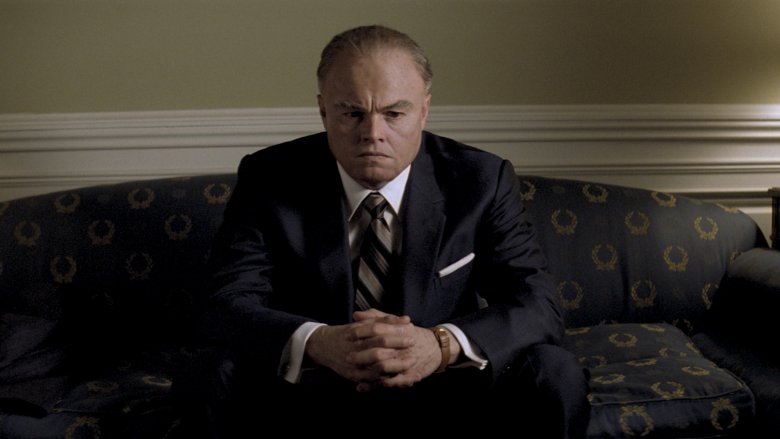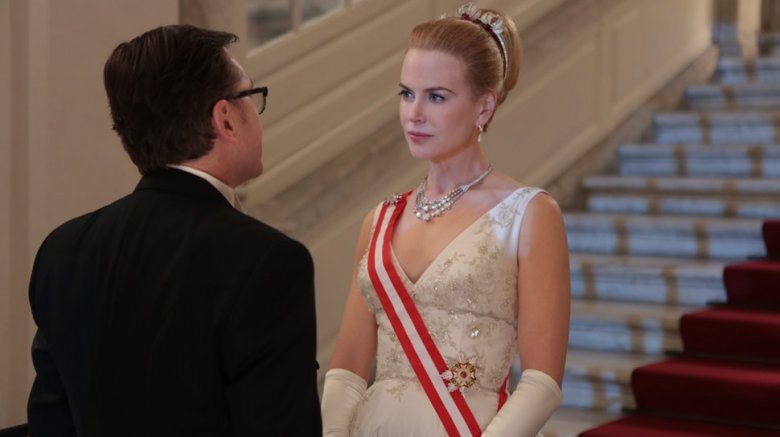Oscar Bait Performances That Turned Out Terrible
There's a peculiar sort of formula to many of the world's Oscar-winning movies. The projects that win Best Picture are rarely the best films of the year — most often, they're just the ones that appeal to the most voters in the Academy of Motion Picture Arts and Sciences. As a result, a certain template has emerged over the years for movies that do well during awards season, particularly milquetoast dramas that fall in a category called "Oscar bait."
These movies tend to share some common traits. They can take place in historical settings, as biopics of famous figures. Or they can be ponderous modern-day dramas that require the lead actor to transform themselves dramatically, portraying characters so unlike themselves in look and manner that a reward for the work feels undeniable. Since these kinds of movies have been known to be rewarded in the past, filmmakers and actors sometimes seem to try and engineer an Oscar victory by incorporating these elements on purpose.
Often enough, those efforts fail, with actors putting their heart on their sleeve and their health on the line for a movie that ultimately ends up falling short of expectations. But sometimes, the disparity between what the filmmakers try to do and what they end up doing can come off as completely hilarious. Want some examples? Read on for a history of Oscar bait performances that turned out to be just terrible.
I Am Sam
One of the worst ideas in the history of cinema was casting Sean Penn as a mentally disabled person and having him one hundred percent commit to it. Especially considering Penn's well-established reputation as a self-serious dramatic actor and humanitarian, 2001's I Am Sam has aged extremely badly.
Centering on a mentally disabled father fighting for the right to raise his daughter, I Am Sam pours on the schmaltz as it blitzes through a tearjerking, rousing story of triumph over adversity and the goodness at the heart of man. The movie's sins don't just lie in Penn's performance as Sam, but in putting him opposite actors who actually have disabilities. No matter how convincing Penn's work might be, it can't come anywhere near bypassing the discomfort and just plain weirdness of those interactions. For this and other problems, the movie was only nominated for one Oscar for Penn's performance, which he lost to Denzel Washington for his work in Training Day.
Chapter 27
The senseless murder of John Lennon is a story in the sense that it was a news event. No one expected it, it happened for no reason, and the world moved on. But Jared Leto apparently thought he could earn some accolades for going back to the days before the songwriter's death, bringing Lennon's killer to life on screen in the execrable Chapter 27.
The title refers to the 26 chapters in JD Salinger's Catcher in the Rye, which was among the killer's possessions when he was taken into custody. As a piece of trivia, it's meaningless, and it speaks to the general pointlessness of this movie. In the best of circumstances, this movie would still feel unnecessary — probably too pointless of a story for much Oscar consideration. But unfortunately for Leto, the filmmaking here borderlines on the incompetent, wasting the hard work and physical transformation he put into the role.
Despite gaining 67 pounds and developing a host of medical difficulties over it, Leto's performance as the unbalanced assassin ended up in a movie that was a total waste of time. Chapter 27 is mostly remembered as a project in which an actor went so far and received so little. In their pursuit of verisimilitude, the filmmakers forgot to figure out whether this was a story worth telling.
Gotti
We've litigated it before exhaustively, but this movie sucks. You can see what drew star John Travolta to the project; on paper, at least, a lot about Gotti sounds pretty appealing. A biopic of New York City crime boss John Gotti, chronicling his rise, reign, and ultimate fall? Sounds all right. The movie is pitched as a generational story that follows not just Gotti's life, but also his son's, as the elder Gotti ages and grows ill. When just the bare facts are looked at, this is exactly the sort of biopic role that draws awards like magnets. In execution, however, it's just embarrassing.
Not only is the movie around Travolta made with stunning incompetence, but his performance is more high camp than high art. Travolta commits to the role theatrically, chewing over his syllables and leaning his whole body into every scowl and moment of swagger. It's awkward, it doesn't work, and worst of all, it's only sporadically entertaining.
Granted, at the time of this writing, the 2019 Academy Award nominees haven't been announced yet, so Gotti still technically has a chance to pull off a shocking victory come Oscar season. But barring some old-school, full-court-press, mob-style threats of violence against the Academy's voters, could it really happen? Absolutely not, fuhgeddaboutit.
Hyde Park on Hudson
Tedious and dull, Hyde Park on Hudson takes what could be a rather interesting story and lets it wither on the vine. Set during a 1930s Hudson Valley summit between Franklin D. Roosevelt and the king and queen of England, the movie follows Roosevelt's love affair with a distant cousin, chronicling a carefree episode with a tense political backdrop. The resulting movie is a flighty thing, a comedy of manners and scandal that hits with weightless impact, never really justifying its own existence.
Bill Murray stars as FDR, turning on the charm in a script that serves him, and the character he's playing, rather poorly. While Murray would seem perfectly suited to a comic take on the four-term president's life, the script itself forgets to give him much of anything that funny or dramatically intriguing to do.
Despite the lush period setting, Oscar voters didn't bite on what Hyde Park on Hudson was offering. Ultimately, Murray was nominated for a Golden Globe in the category of Comedy or Musical, losing to Hugh Jackman for his performance in Les Miserables.
Collateral Beauty
Collateral Beauty — woof. Whole lotta people getting knocked for this one.
This capital-D drama, arriving in theaters with a stacked cast and some heavy themes, ended up backfiring spectacularly for everyone involved — especially the actors.
Slammed by critics, Collateral Beauty earned only 14 percent on Rotten Tomatoes for its calculated and manipulative story about an ad executive trying to move on following the death of his daughter. To help him get back on his feet, his partners at the company hire a group of actors to play the supernatural manifestations of Love, Time, and Death — you know, that old technique.
The result feels like it was made by aliens, and is too ponderous and treacly to appeal to even the most sentimental Academy voter. You get the sense that everyone involved thought they'd smashed a home run right out of the park, turning in a modern classic of a moral fable, but this is one of those dingers that catches on the bleacher roof and bounces back, braining a concessions person on its way back down to the field. It may have looked like a winner, but it caused damage. Not only did the movie fail to bring home trophies, it also drew the attention of the Razzies, getting "the Entire Cast of Once-Respected Actors" — a group that included Will Smith, Edward Norton, Keira Knightley, Michael Peña, Naomie Harris, Jacob Latimore, Kate Winslet, and Helen Mirren — nominated in the category of Worst Screen Combo.
Mr. Church
What has Eddie Murphy been doing? As much as he's stayed out of the spotlight over the last decade, he's never really stopped acting. Instead, he's just been choosing increasingly ill-advised roles as a performer, arguably none of them worse than 2016's Mr. Church.
Mr. Church is directed by Bruce Beresford, who was previously responsible for the hotly disputed Best Picture winner Driving Miss Daisy. Like that movie, Mr. Church is a movie about race, inasmuch as the complexities of race relations in America can be explored through the sentimental depiction of one interracial friendship.
Toothless and uninteresting, Mr. Church is a completely surface-level movie, never interrogating the inner lives of its characters as it pours on the sentimentality. It's hard to gauge what Murphy brings to the role, playing against type in this underwritten drama. With a better script and a different approach, he might have been able to access some inner depths, and do something interesting. As it stands, the movie is a feature-length experience that feels like watching Murphy as he stands with dignity in the shallow end of the pool. He doesn't do anything interesting, and what he's doing doesn't look difficult. He's just there.
Regarding Henry
The 1990s were the decade in which Harrison Ford slowly stopped giving a damn about his acting career, and it appears it was all downhill from Regarding Henry. Oh, he still had a few charismatic lead turns left in him, including The Fugitive and Clear and Present Danger, but his efforts to actually imbue a character with character instead of showing up and just playing himself were completely depleted by the decade's end. What went wrong? Well, regarding Henry...
Following a high-powered corporate lawyer in New York City after a gunshot wound radically alters his personality, Regarding Henry is a curious misfire from a bunch of professionals you'd think would know better. Directed by the ridiculously accomplished Mike Nichols, the movie comes off like one long, slow mistake. While Ford commits to Henry's journey from attorney to imbecile, as the script by J.J. Abrams so delicately puts it, the craftsmanship of the movie never manages to overcome the original sin of its concept. It's a weird and awkward movie, where humans don't quite act like humans and the drama feels unearned, remarkable for being one of the few Oscar bait movies that substitutes "character growth" with "getting shot in the face."
Seven Pounds
Seven Pounds is another swing and a miss from Will Smith that, like Collateral Beauty, vaguely feels like it was made by aliens who visited our galaxy as part of an effort to win Oscars. You wouldn't think to categorize this movie as "torture porn" based on the look of it, but it certainly is — it's emotional torture porn.
Seven Pounds follows Smith as a man seeking redemption for the pain he caused through a fatal texting-while-driving incident. As penance, he seeks out seven worthy people in need of organ donations to receive his healthy body parts after he kills himself, thereby putting more good into the world than pain by the time his life's accomplishments are tallied. As a result, the movie barely has a story — everything is in service to a character study of Smith's protagonist as he works his way up to a sad, sentimental sacrifice.
But whatever affecting qualities the journey may have are completely deflated by the method of his character's suicide — stung to death by a box jellyfish while sitting in an ice bath. It all makes sense, as far as the practicalities of how you'd really do this are concerned. But actually seeing movie star Will Smith flop around in a motel bathtub as a jellyfish exacts poetic vengeance on his body isn't the kind of thing you want to honor with awards. You mostly want to make sure no one in the theater hears you snickering.
J. Edgar
Conceptually, J. Edgar has absolutely everything going for it. A biopic of FBI director J. Edgar Hoover starring Leonardo DiCaprio, the story weaves politics, biography, and sexuality together in a way that hopes to sum up an entire chapter in American history. Based on its cast, crew, and concept, it's the sort of movie Oscars were made to be given to. Directed by Clint Eastwood and written by Dustin Lance Black, the talent that went to work on this project is undeniable, which makes it all the more interesting that the resulting movie just doesn't hold the viewer's interest at all.
Presented slackly and with little driving momentum, J. Edgar is the sort of biopic that gives the genre a reputation for being boring. Rather than an epic tour de force that finally notched Leo his coveted Oscar, J. Edgar sank like a stone in awards season. In the end, DiCaprio's portrayal of the lawman across 50 years of his life garnered a Golden Globe nomination and not much else.
Diana
Naomi Watts is a great actress who, by our metric, has never really turned in a bad performance. She's talented, charismatic, and fearless in her choice of roles — but that willingness to try stuff and be bold has landed her in some pretty crappy movies. Sometimes she secures her legacy with an all-time great like Mulholland Drive, and sometimes she ends up floating through movies like The Book of Henry, Shut In, The Ring Two, or Diana.
Scoring only an 8 percent on Rotten Tomatoes, Diana is a failure on just about every level, failing to present an accurate picture of Diana, Princess of Wales or effectively convey what made her story worth telling in the first place. As a result, the movie went home empty-handed during awards season, only receiving a nomination from the Razzies. Watts is typically always the best part of her more lousy movies — but she can't even come close to saving this one. The only thing that deserves an award is that glorious, feathery hair.
Grace of Monaco
Nicole Kidman's efforts to bring a princess back to life on the big screen also turned out exceptionally poorly. Earning an 11 percent on Rotten Tomatoes across 70 reviews, it's clear this movie worked for nobody, failing to remind viewers why actress-turned-princess Grace Kelly was ever interesting to begin with.
Among Grace of Monaco's biggest sins is the way it sacrifices story for the sake of exposition, filling its characters' mouths with unrealistic dialogue for the sake of establishing the setting and moving the plot along. It feels in every way like a movie, never transporting the viewer into its narrative. Part of the responsibility rests with Kidman, who never manages to embody any kind of character approximating the real-life Kelly. Tedious and sort of embarrassing to watch, it's no surprise that the movie was enthusiastically booed upon its premiere at the Cannes Film Festival. A shallow piece of fluff made in what feels like rather calculated fashion, it forgets to ever entertain its audience — the biggest sin a movie could possibly make. It's just shoddy work straight through, not worth rewarding — just worth avoiding.
